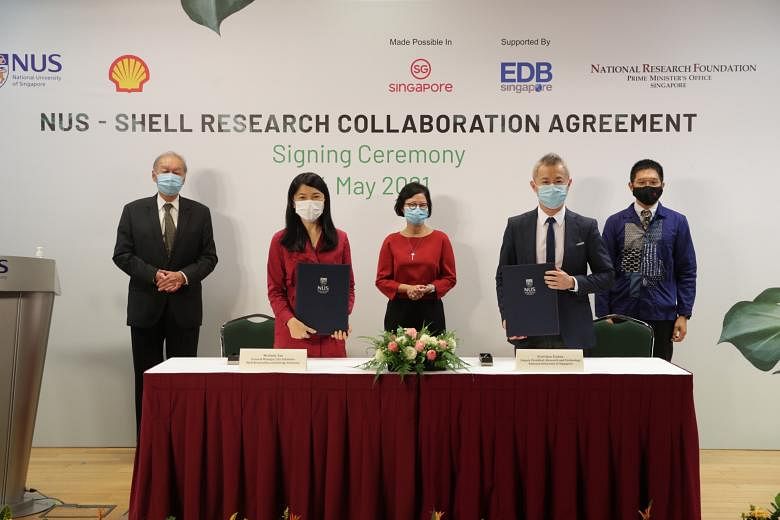SINGAPORE - The National University of Singapore (NUS) and energy giant Shell are teaming up in a $4.6 million research project to convert carbon dioxide (C02) - a major greenhouse gas - into cleaner fuels and other chemicals for everyday use.
The three-year research programme into a relatively new field is supported by the National Research Foundation Singapore and was formalised on Friday (May 14) at a signing ceremony.
The participants are hoping that promising lab results found in the course of research can be applied on a larger scale, helping firms - and Singapore - to better meet emission targets for more sustainable growth.
The proposed method will effectively recycle carbon dioxide (CO2) in the atmosphere. By electrochemically treating CO2, the researchers want to create ethanol and n-propanol, both of which, when blended with petrol, become cleaner burning fuels.
Ethanol and n-propanol can also be further dehydrated to produce ethylene and propylene, which are commercially important in making polymers for a range of common items from medical equipment to houseware.
It is a fledgling field, and current methods have not been able to produce yields that can meet industrial needs. A team led by associate professor Jason Yeo from the NUS chemistry department will focus on discovering new catalysts that it hopes can help bridge this gap.
Professor Chen Tsuhan, the university's deputy president of research and technology, has high hopes for the new project. He said NUS has been building up its research capabilities in the field of carbon dioxide reduction for nearly a decade, and can now do so in an industrial setting with support from Shell and the National Research Foundation Singapore.
"Converting (carbon dioxide) into useful products is a promising strategy to mitigate carbon emissions and close the carbon cycle," he said.
"The innovative and commercially viable solutions generated through this research programme will help to build a path for a greener future for generations to come."
For Shell, it is a way of achieving its hopes to be a net-zero emissions energy business by 2050 or sooner. It also wants to cut its carbon dioxide emissions in Singapore by about a third within a decade.
Said Mr Ajay Mehta, its general manager of new energies research and technology: "Meeting our (carbon emission) ambition will require the best minds from around the world to come together to tackle the challenge of climate change. We, however, also believe that we cannot do this alone.
"It is partnerships like this, based upon one-on-one, peer-to-peer, scientific collaboration between industry and academia that will lead to the necessary insights and breakthroughs required to solve big societal challenges."
Shell said that as an energy giant involved in almost the entire value chain of energy production, it can contribute by scaling up promising catalysts or processes that the research team finds.
It will also conduct analyses to assess the techno-economic and environmental impact of the processes developed by the NUS team.


